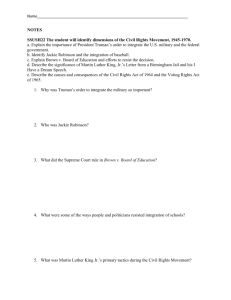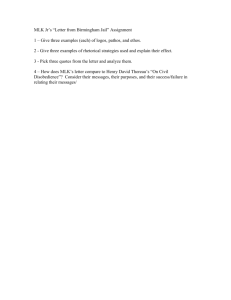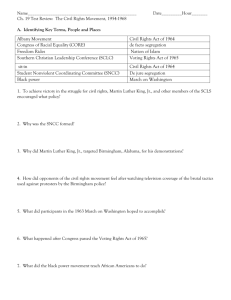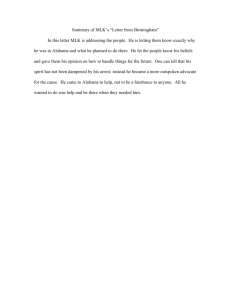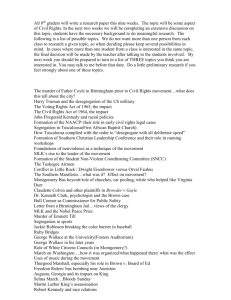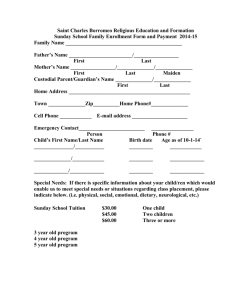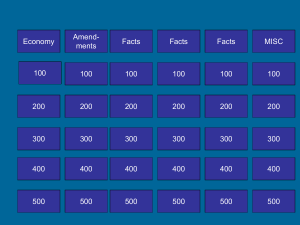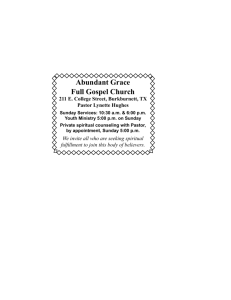March From Selma to Montgomery, Alabama to
advertisement
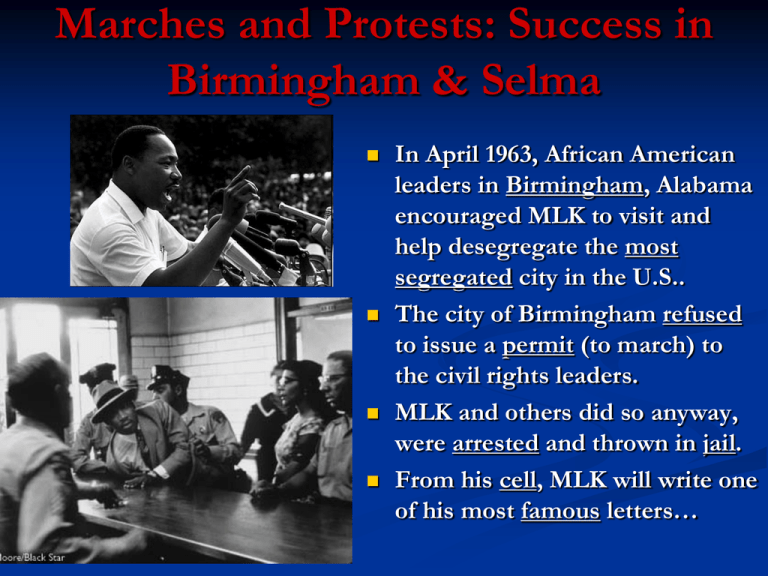
Marches and Protests: Success in Birmingham & Selma In April 1963, African American leaders in Birmingham, Alabama encouraged MLK to visit and help desegregate the most segregated city in the U.S.. The city of Birmingham refused to issue a permit (to march) to the civil rights leaders. MLK and others did so anyway, were arrested and thrown in jail. From his cell, MLK will write one of his most famous letters… “Letter from a Birmingham Jail” For years now I have heard the word "wait!" It rings in the ear of every Negro with piercing familiarity. This "Wait" has almost always meant "Never." We must come to see, with one of our distinguished jurists, that "justice too long delayed is justice denied." SECTION 359. SEPARATION OF RACES All public facilities must have separate entrances, exits, seating and standing areas for white persons and negroes. It shall be unlawful for any person in charge or control of any room, hall, theater, picture house, auditorium, yard, court, ballpark, public park, or other indoor or outdoor place, to which both white persons and Negroes are admitted, to cause, permit or allow herein or thereon any theatrical performance, picture exhibition, speech or educational or entertainment program of any kind whatsoever, unless such room, hall, theater, picture house, auditorium, yard, court, ball park, or other place, has entrances, exits, and seating or standing sections set aside for and assigned to the use of Negroes, unless the entrances, exits and seating or standing sections set aside for and assigned to the use of white persons are distinctly separated from those set aside for and assigned to the use of Negroes, by well defined physical barriers, and unless the members of each race are affectively restricted and confined to the sections set aside for and assigned to the use of such race. SECTION 369. SEPARATION OF RACES It shall be unlawful to conduct a restaurant or other place of the serving of food in the city at which white and colored people are served in the same room, unless such white and colored persons are effectually separated by a solid partition extending from the floor upward to a distance of seven feet or higher, and unless a separate entrance from the street is provided for each compartment. SECTION 597. NEGROES AND WHITE PERSONS NOT TO PLAY TOGETHER. It shall be unlawful for a Negro and a white person to play together or in company with each other in any game of cards, dice, dominoes or checkers. Any person, who being the owner, proprietor or keeper or superintendent, of any tavern, inn, restaurant, or other public house or public place, or the clerk, servant or employee or such owner, proprietor, keeper or superintendent, knowingly permits a Negro and a white person to play together or in company with each other at any game with cards, dice, dominoes or checkers in his house or on his premises shall, on conviction, be punished as provided in Section 4. Jail As a Method Of Protest The resulting images were an embarrassment to the nation. After 11 days, MLK was released from jail due to pressure from the Kennedy Administration. He immediately began to organize another march. When Dr. King said part of his strategy was to fill the jails, Sheriff Bull Connor said, “That’s okay, we got the room.” Southern Justice 1963: Dogs and Fire Hoses Student Protesters in Birmingham Results of Birmingham Desegregation of city facilities and fairer hiring practices. President Kennedy introduced a stronger Civil Rights bill. • After the Birmingham marches, the 16th St. Church was bombed. 4 girls were killed in the blast. • Birmingham, becomes known as “Bombingham” • Over 63 bombings with no convictions. • This incident increased support for Civil Rights March on Washington To encourage the passage of the bill MLK and others organized the March on Washington. 200,000 people from all over the country and from all different races came to hear prominent speakers, especially MLK. The bill passed after President Kennedy was assassinated. “I Have a Dream” Speech The Civil Rights Act of 1964 In his first public address to the nation, President Johnson said nothing “could more eloquently honor President Kennedy’s memory than the earliest possible passage of the Civil Rights bill” The Civil Rights Act of 1964 prohibited segregation in public accommodations and discrimination in education and employment. It also gave the President the power to enforce the act’s laws. Methods of Protest: Education-Freedom Summer James Farmer-SNCC Northern whites and blacks were trained and then sent to Mississippi to help educate and register AA’s to vote. White Southerners were very disturbed by this attempt. AA’s were a big majority of the population in many counties, but made up less than 1% of registered voters. SNCC was at the forefront of this voter registration movement. Freedom Summer - 1964 SNCC volunteers were first informed that the work was dangerous, even deadly. There would be many incidents of intimidation, violence, and murder. Violence could come from either the police or the citizens of the town. Three Civil Rights Workers Murdered! "Your work is just beginning. If you go back home and sit down and take what these white men in Mississippi are doing to us. ...if you take it and don't do something about it. ...then God damn your souls." Mississippi CORE leader Dave Dennis delivering the eulogy for James Chaney, murdered by cops and the Klan in Philadelphia MS, 1964. Freedom Summer is not very successful. However, the incredible amount of violence and hatred towards the volunteers and potential voters, cause more attention to be directed to the issue of voting rights. Bob Dylan lends support Voting Registration Difficulties March From Selma to Montgomery, Alabama to support voting rights – March 7, 1965 Voting was still a problem in the South. Police would arrest people just for attempting to vote. The March route crosses Lowndes County, stronghold of the Ku Klux Klan. Population: 73% Black, 27% white. Voter registration: 0 % Black, 117% white!! A city with overt institutional racism, Selma, Alabama was a stronghold of segregation. In 1961 only 156 out of 15,000 African Americans were registered to vote. Late in 1964, the Southern Christian Leadership Conference (SCLC) decided to make Selma its focus. Many protests were staged, several of which ended in violence and arrest. Another, on February 16, ended in the death of marcher Jimmie Lee Jackson The Route to Montgomery The Posse Storm Troopers? The One-Sided Battle President Johnson: “What happened in Selma was an American tragedy. The blows that were received, the blood that was shed, the life of the good man that was lost, must strengthen the determination of each of us to bring full and equal and exact justice, to all of our people.” • Once again the nation was shocked! • President Johnson ordered the National Guard to protect the marchers. • He also went on television promising a new Voting Rights Act… “And we shall overcome!!!” On to Montgomery!!! Bloody Sunday by U2 I can’t believe the news today Oh, I can’t close my eyes and make it go away How long...How long must we sing this song? How long? how long... ’cause tonight...we can be as one Tonight... Broken bottles under children’s feet Bodies strewn across the dead end street But I won’t heed the battle call It puts my back up Puts my back up against the wall Sunday, bloody Sunday And the battle’s just begun There’s many lost, but tell me who has won The trench is dug within our hearts And mothers, children, brothers, sisters torn apart Sunday, bloody Sunday How long...How long must we sing this song? How long? how long... ’cause tonight...we can be as one Wipe the tears from your eyes Wipe your tears away Sunday, bloody Sunday And it’s true we are immune When fact is fiction and TV reality And today the millions cry We eat and drink while tomorrow they die The real battle yet begun (Sunday, bloody Sunday) To claim the victory Jesus won Sunday bloody Sunday The Voting Rights Act of 1965: Federal officials could register voters if city officials refused. Eliminated literacy tests. That year 400,000 African Americans registered to vote in the Deep South Voter Registration Over the next three years, almost one million more African Americans in the South registered to vote. By 1968, African American voters had a significant impact on Southern politics. During the 1970s, African Americans were seeking and winning public offices in majority African American electoral districts. The End of the Movement For many people the civil rights movement ended with the death of Martin Luther King, Jr. in 1968. Others believe it was over after the Selma March, because there have not been any significant changes since then. Still others argue the movement continues today because the goal of full equality has not yet been achieved.
